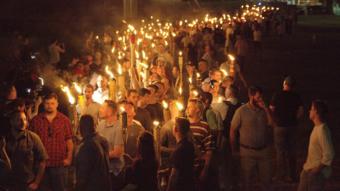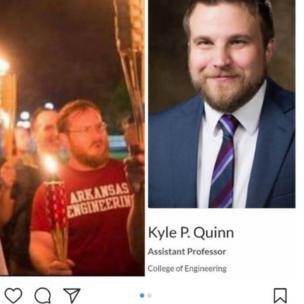 REUTERS
REUTERS
A university professor has been wrongly described as a white supremacist by amateur internet detectives on social media wishing to publicly shame those who took part in rallies in Charlottesville.
Professor Kyle Quinn who works at the University of Arkansas was mistakenly identified as one of the unmasked protesters taking part in far right protests on Friday.
The professor's ordeal began on Saturday when thousands began sharing an image of a bearded man posted by Twitter userYes Youre Racist. It has been publishing photos of those who attended the rally under the hashtag #ExposetheAltRight.
The request didn't go unheard. The internet's digital detectives found an image of Professor Quinn and claimed he was the man pictured at the rally. Although the professor may share a similar look and build to the man photographed, he was in fact more than 1,000 miles away from the demonstrations in Virginia.
 @YOUNGWAXGOD/TWITTER
@YOUNGWAXGOD/TWITTER
But the close resemblance was enough to satisfy many of the internet's amateur sleuths. More than 11,000 people retweeted the photo. One social media user posted: "My Facebook feed says this is University of Arkansas faculty member, Kyle P. Quinn."
Others tweeted the University of Arkansasposting: "@UArkansas FIRE KYLE P. QUINN. There cannot be any negotiation or wavering on this issue."
Another user posted: "@UArkansas FIRE KYLE P QUINN Engineer!!!! OPEN RACIST ON STAFF! What kind of University would keep him employed?"
'It's not me'
On Saturday Professor Quinn was forced to defend his character by by tweeting:"The man in the photo is not me. I am in Fayetteville, Arkansas, not Virginia.
A day later he took to social media againposting: "The individual who wore an engineering shirt in #Charlottesville is not me. I proudly support a diverse environment at U of A."
But his responses didn't stop scores of people from calling him a racist, threatening him, publishing his home address and demanding he lose his job. The reaction prompted a further explanatory tweet from the professor:
What is 'doxxing'?
The controversial act of publishing the details of an anonymous social media user without their permission and potentially leaving them open to harassment is known as 'doxxing.'
After the Charlottesville rallies many social media users 'doxxed' those they believed had taken part, in an attempt to expose their identities to friends and employers. But unlike the instance with Professor Quinn their efforts did yield the results they wanted.
- White supremacy: Are US right-wing groups on the rise?
- A reckoning in Charlottesville
- Trump condemns 'evil racism' in Charlottesville
Cole White, one of those who attended the rally has now reportedly been fired by his employer, the Top Dog hotdog restaurant chain in Berkeley, California.
Peter Cvjetanovic, a 20-year-old student who was captured in one of the most widely shared photos, has defended his right to attend one of the rallies.
Doxxing meanwhile remains a controversial way of outing people despite social media platforms considering it a violation of their rules.
A recent doxxing story came in July when CNN were accused of "blackmail" by prominent alt-right social media influencers following the broadcaster's investigation into the identity of a Reddit user who had made a viral wrestling gif.
The controversy arose after CNN, which has not revealed the true identity of the user, took steps to delete offensive material the user had posted. CNN said it: "Reserves the right to publish his identity should any of that change".
No comments:
Post a Comment